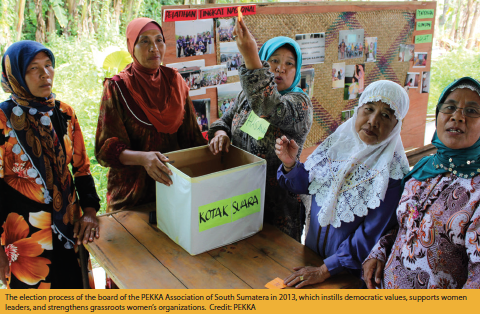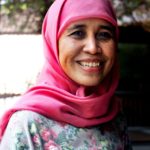Introducing the Concept of Social Accountability in Women’s Cooperatives in Indonesia
Akuntabilitas sosial (the direct translation of Social Accountability in the Indonesian language) is a new phrase that has only been known in recent years in Indonesian politics and development. Before international development agencies brought the term Akuntabilitas sosial to Indonesia, organizers of rural women’s cooperatives were communicating similar ideas using the pre-existing Indonesian term Tanggung Gugat Sosial. This phrase refers to a two-way process where the community demands the fulfillment of its rights, and the authorities take responsibility for the obligations they carry. In Perempuan Kepala Keluarga (Women-Headed Family Empowerment, known as PEKKA), a women’s cooperative in rural Indonesia, the term Tanggung Gugat Sosial was introduced from the beginning of our movement to organize women-headed families in 2002.
Before international development agencies brought the term Akuntabilitas sosial to Indonesia, organizers of rural women’s cooperatives were communicating similar ideas using the pre-existing Indonesian term Tanggung Gugat Sosial. This phrase refers to a two-way process where the community demands the fulfillment of its rights, and the authorities take responsibility for the obligations they carry.
The PEKKA self-help groups adopted cooperative principles and systems where the members learn about the democratic election of group leaders (one member one vote), the right of members to speak out and have an opinion in planning activities and managing group funding, and determining various rules in the group. The group leaders chosen by the members then carry out all of the agreed-upon plans and provisions. At the end of each year, the group leaders make an accountability report to the members through the annual meeting. All members can question the report provided and decide collectively whether the report is accepted or rejected. Through this group activity the PEKKA community learns and practices the social accountability system in its self-help groups.
Based on experiences in their self-help groups, the PEKKA members were then able to practice tanggung gugat sosial in a broader system at the village and district levels through the use of kontrak sosial or social contracts with candidates or government officials. This opportunity arose through a decentralized government system where people directly elect regional heads from the village to the province. PEKKA introduced kontrak sosial in the political events of local government elections, especially at the district level. For example, the PEKKA self-help groups in East Flores have made kontrak sosial with candidates of the District Head election in 2005. They were able to sign a “social contract” with the candidates since they have a large number of voting members in their self-help groups. One of the points agreed in the social contract is the promises of the candidates to support the PEKKA agenda and women’s empowerment in general if they are elected. The successful candidate tried to fulfill his promises, and every year PEKKA organized a forum where they and other community members engaged in dialogue with the elected district head to question his various policies and demand his campaign promises, thus practicing tanggung gugat sosial. These good practices have become part of the political process of PEKKA groups in various districts.
Based on experiences in their self-help groups, the PEKKA members were then able to practice tanggung gugat sosial in a broader system at the village and district levels through the use of kontrak sosial or social contracts with candidates or government officials.

With the strengthening of the socio-political position of the PEKKA groups in the community, they are then encouraged to be involved in the Musrenbang (development planning deliberations) from the village to the district level. In this Musrenbang the development plan is discussed by community representatives. The birth of the Village Law in 2014 further strengthened the space for public participation such as PEKKA groups as a representative of marginalized women, to be involved in Musrenbang at the village to district level. We train selected PEKKA members and leaders to be actively involved in Musrenbang so that their agendas and concerns can be channeled through the development planning. The results of the Musrenbang become a community instrument to monitor the performance of their leaders. On the other hand, KLIK-PEKKA (information and consultation service clinic) at the village level is an instrument developed by PEKKA to demand the district level government be accountable to the public services especially addressed to the most marginalized community members. Through KLIK-PEKKA, government agencies responsible for public services such as health, education, social protection, and access to justice are confronted directly with marginalized communities who are entitled to services but fail to get access due to several conditions, including their invisibility in the data system. They must answer the community’s questions about their public services rights and then they have to fulfill the community demands. These are some of the processes that PEKKA uses to introduce Social Accountability to the community using traditional Indonesian terms.
For more on PEKKA’s work, see Movement-building for Accountability: Learning from Indonesian Women’s Organizing


